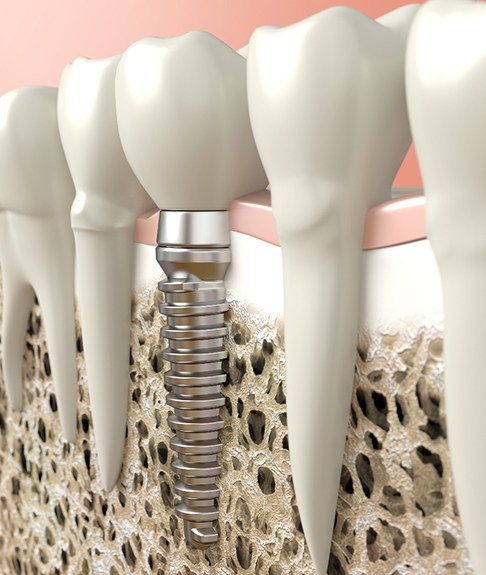Dental Implants – Lakewood, CO
Replace Missing Teeth
from the Roots Up
The most obvious visible symptom of a missing tooth is the gap left in your smile, which can be filled with a bridge or denture. But this is only a partial replacement; the roots that used to rest inside of the jawbone will still be missing. There’s only one option if you want to completely replace the entire tooth structure from the roots up: dental implants in our Lakewood, CO dental office. Call Dr. Carole Emanuel today to set up an appointment and learn what puts this tooth replacement option in a class of its own.
Why Choose Carole Emanuel, DDS for Dental Implants?
- Team-Based Approach to Implant Placement
- Long-Lasting, Fully Personalized Restorations
- Friendly Dentist with Over 25 Years of Experience
What are Dental Implants?
If you saw a dental implant by itself, your first thought likely wouldn’t be, “new tooth.” Without a restoration such as a crown topping it, a dental implant simply looks like a titanium screw. That’s because the implant itself is actually the support for a prosthetic tooth; it’s inserted into the jawbone to function as a root, and once the mouth has healed a crown, bridge, or denture will be attached to it so that you can use it to bite, smile, and chew.
The 4-Step Dental Implant Process

Unlike traditional dentures, the dental implant treatment process can take several months to complete. However, implants are made to last for many decades without needing to be replace. Ultimately, the wait is a very small price to pay. Everyone’s treatment is a little bit different, but here are the four main steps that you can expect.
Initial Dental Implant Consultation

The first step when it comes to restoring your smile is attending a consultation. At this time, we will take a look at your smile and surrounding facial structures. This will help us to determine whether dental implants are a good option for you and how they should be placed in your mouth.
Some patients need to have preliminary procedure completed before getting dental implants, like bone grafting, gum disease treatment, and tooth extractions. After this, we can move forward to planning the rest of your treatment. During your consultation, we are also happy to walk you through the process so that you know exactly what to expect, including the timeline and cost.
Dental Implant Surgery

Next comes your dental implant placement surgery. First, your mouth will be numbed with a local anesthetic. Then a small incision is made into the gum tissue to access your jawbone. The implants will be placed at precise locations and angles. Lastly, your gums will be closed, and the protective caps will be placed over the dental implant posts to keep them safe during the healing process.
Dental Implant Osseointegration & Abutment Placement

Over the next 3 to 6 months, the fusion process will take place between the implant(s) and your jawbone. This process is called “osseointegration.” This allows for your implants to have a sturdy foundation so that your replacement teeth stay firmly in place when you speak and chew. Once this process has been completed, the metal abutment will be placed on the end of your implant.
Delivery of Dental Implant Restorations

A few weeks after your abutment has been placed, your restoration should be ready. You can return to the practice where you will receive your new crown, bridge, or denture (depending on the number of teeth that you are having replaced). At this point, we will check to make sure that your bite is comfortable, and you will be sent on your way to reap the benefits of your complete smile!
Benefits of Dental Implants

Dental implants improve your day-to-day life and your overall health in several ways, and they have many advantages that other restorations don’t. By renewing your missing pearly whites with these titanium posts, you can be sure to enjoy a comprehensive and natural-feeling solution that’ll feel like you have your normal teeth again. Here are several benefits of dental implants that you can expect to appreciate.
Day-to-Day Benefits

- Enjoy your favorite meals without worry: Those who get dental bridges or dentures often stay clear of certain foods that are tougher to chew, such as apples, corn on the cob, and steak. Since dental implants will anchor your restoration(s) directly to your jawbone, you’ll be able to regain the majority of your natural chewing power, allowing you to enjoy all of your favorite meals.
- Drink your favorite beverages: Most people with more traditional tooth replacements tend to shy away from dark-colored drinks, like coffee and wine, to avoid staining their restorations. Dental implants, however, won’t be as susceptible to discoloration or warping from high temperatures. This means you can enjoy any kind of drink worry-free!
- Smile confidently: Due to their ability to look and feel like natural pearly whites, you won’t have to worry about your dental implants slipping out of place. Additionally, your custom restorations will also look exactly like normal teeth, so you’ll be free to show off your beautiful and lifelike smile with confidence.
Health Benefits

- Preserve your jawbone & facial shape: Dental implants serve as your new permanent tooth roots, which will stimulate your jawbone and promote stronger tissue. Not only will this help preserve your other remaining teeth, but you’ll also be able to retain a more youthful appearance while preventing further tooth loss.
- No tooth sensitivity or gum irritation: Dental bridges require preparing natural teeth to support the restoration, which will weaken the enamel and can result in sensitivity. Dentures can also cause gum irritation once they start becoming ill-fitted. With dental implants, you won’t have to be concerned with either of these issues.
- Maintain a healthy smile & body: You’ll simply need to care for dental implants just like you would your natural teeth. Since they’re easier to keep clean, you can easily reduce your risk of decay and gum disease. You’ll also help lower your chances of experiencing issues like diabetes, osteoporosis, and heart disease.
Long-Term Benefits

- Longer-lasting & reliable results: Dental implants generally have a success rate of 95% or more, even 10 years after being placed. With proper care, you can also expect them to last several decades to a lifetime.
- Save money & time on your pearly whites: Though dental implants do come with a higher upfront value compared to dental bridges and dentures, they can end up saving you much more when it comes to replacements, repairs, and visits to your dentist.
- Longer lifespan: Rebuilding your smile with dental implants can help you live longer. Recent studies have shown that people with 20 or more of their teeth at age 70 can have an increased chance of a longer lifespan compared to those with less than 20 teeth at the same age.
Who Dental Implants Can Help
Because dental implants are highly personalized, determining whether this modern tooth replacement is right for you requires a thorough examination of your mouth. Factors such as the number of implants needed or the necessity for preliminary dental procedures can affect your candidacy. However, should you be eligible, investing in dental implants is highly worthwhile. Addressing your needs now will ensure your implants last for many years, require minimal maintenance, and fully restore your everyday functions.
Who Is a Good Candidate for Dental Implants?

To qualify for dental implants, you must have lost at least one tooth. You also need a smile that’s infection free, and you should be in good enough health overall to safely undergo surgery. If you’ve suffered bone loss in the jaw, you may need bone grafts so that there’s enough bone density to place dental implants in the desired area. Preparations can be made to get you on track for dental implants even if you aren’t the best candidate for the procedure at first. After your smile is healthy, implants can be used to replace any number of teeth.
Missing 1 Tooth

When just one tooth is lost, you’ll only need to receive one dental implant post to replace it. A single crown is all it will take to fill in the gap once the implant has fully integrated with the jaw. No alteration of the surrounding teeth will be needed to hold the new restoration in place, letting you preserve your natural smile.
Missing Multiple Teeth

Dental implants can be used to replace any number of teeth, although the number of implant posts needed for the procedure is not set in stone. For example, three or more teeth in a row can be replaced with two dental implants that are connected by a custom-made dental bridge.
Missing All Teeth

By placing a series of dental implants (usually four to six) throughout your jaw, you can seamlessly replace all the teeth in your arch. Implant dentures offer the most stable and robust full smile replacement available. One advantage of this solution is that it doesn't require a dental implant for each tooth. Instead, we use a minimal number of implants to provide maximum stability.
For patients experiencing severe tooth loss and lacking sufficient jawbone density for an implant denture, we offer All-On-4 dental implants. This approach uses four strategically placed implants to support a full denture. It can help you avoid preliminary treatments such as bone grafting, and you can even have your new denture placed the same day as your implants!
Understanding the Cost of Dental Implants

There’s no denying that dental implants cost more on average than traditional bridges and dentures, but the fact that they can potentially last the rest of your life without needing to be replaced can balance out the long-term expenses. The exact amount you pay for dental implant surgery varies depending on the number of missing teeth and the need for preliminary procedures. An estimate for the final cost can be created at your initial consultation.
Preliminary Treatments & Dental Implant Surgery

At your initial consultation, Dr. Emanuel will conduct a thorough evaluation of your smile by examining diagnostic images and conducting a physical review of your teeth and gums. These will allow her to determine whether you require any preparatory treatments to ensure the long-term success of your dental implants in Lakewood. In some cases, patients may need a sinus lift, bone graft, tooth extraction, gum disease treatment, or ridge augmentation before being able to undergo implant placement surgery. These will all incur separate costs in addition to your dental implant treatment.
Other Factors That Impact the Cost of Treatment

There are a number of additional factors that can also inform the cost of dental implants that our team will discuss with you at your consultation, including:
- How Many Implants You Need: Depending on how many teeth are missing, you may require the placement of anywhere from one to eight dental implants along an arch.
- The Type of Restoration: Full prosthetics like dentures require more time in the dental laboratory to craft and perfect, making these more costly than partials, bridges, and crowns.
- Materials Used: Your dental implants and prosthetics can be made from a variety of materials, depending on your smile goals and preferences.
How Dental Implants Can Help You Save in the Long-Run

Although dental implants have a higher up-front cost than their traditional counterparts, they’re a great long-term investment, both financially and for your overall health. Because implants can last for 35 years or longer with good maintenance, you won’t have to worry about having them replaced every seven or so years like you would with other restorations. Additionally, they can reduce your risk of oral health problems like gum disease, additional tooth loss, and jawbone erosion.
Does Dental Insurance Cover the Cost of Implants?

Our practice is currently in-network with Delta Premier insurance plans, meaning our patients with this provider can maximize their savings and minimize their out-of-pocket costs by visiting us. That being said, whether your plan covers the cost of dental implants really depends on your individual coverage. In many cases, insurance companies won’t cover the cost of this treatment, as it’s considered to be “cosmetic” in nature. However, we’re seeing this change with time, so there’s always a possibility that yours will! Just give them a call to check your coverage ahead of time.
Making Dental Implants More Affordable

If your insurance doesn’t cover the cost of dental implants or you’re uninsured, we work with CareCredit to make paying for your treatment as easy as possible. CareCredit is a trusted, third-party financer that specializes in financing for medical and dental treatments. Upon approval, you’ll be able to split the cost of your treatment up into small, manageable payments at little-to-no interest, allowing you to easily incorporate the price into your monthly budget.
Maintaining & Caring for Your Dental Implants

Once you have your dental implants, you shouldn’t expect your restorations to decay or experience any cavities. This doesn’t mean they will be immune to being affected by bacteria and infection in the surrounding gum and jawbone tissues. Since your metal posts can potentially last decades to a lifetime, you’ll want to focus on taking care of them properly. Our team will provide you with detailed guidelines on how to maintain your brand-new smile after your treatment. Until then, here are some tips for making the most of your new pearly whites.
Make Oral Hygiene a Priority

Brushing, flossing, and rinsing with mouthwash every day is one of the most important ways to keep problems at bay, such as peri-implantitis—one of the main culprits of failed dental implants. The last thing you want is for the surrounding gums and connective tissues to become damaged or decayed, as your metal posts can end up becoming loose or falling out.
Eat a Healthy Diet

Now that you’ve regained 80% or more of your natural biting power with your dental implants, you’ll be able to enjoy many of your favorite foods that require more chewing. That said, you won’t want to put your gums at risk of bacteria and infection down the road. That’s why it’s best to minimize how often you consume sugary food or drinks, as this can invite germs to accumulate and damage your connective tissues. Stick with a balanced diet, including fruits, vegetables, lean meats, and dairy products to ensure your mouth and implants stay as healthy as possible.
Break Bad Habits

Smoking tobacco can do a ton of harm to your mouth, such as increasing the risk of gum disease and even oral cancer. For this reason, it’s best to refrain from using tobacco products altogether if you want to maximize the lifetime of your dental implants. Be sure to also avoid other habits such as chewing on ice or using your teeth as tools, as these can end up damaging your restorations and require you to pay more for replacements.
Protect Your Dental Implants

If you tend to play contact sports or stay very active, the last thing you want to happen is to accidentally chip, crack, or otherwise compromise your dental implants. Even grinding and/or clenching your teeth during sleep can gradually ruin your restorations. That’s why you should consider investing in custom mouthguards or nightguards for Bruxism so that your implants remain protected.
Schedule Regular Dental Checkups

Other than keeping your smile clean every day with normal brushing, flossing, and rinsing with mouthwash, you’ll want to visit Dr. Emanuel for routine checkups and cleanings. She’ll be able to monitor your oral health and even address any underlying issues she might find that could risk implant failure if left unchecked. For the best results and preventive measures, you should schedule regular appointments every six months.
Dental Implant Failure & Salvage

Dental implants have an incredible success rate of over 95% - even 10 years after they have been placed! However, it is still possible for them to fail. If your newly rebuilt smile is starting to feel uncomfortable, or you have any concerns regarding your replacement teeth, don’t hesitate to reach out to us. It may not be too late. We might be able to restore your smile through dental implant salvage treatment.
Learn More About Dental Implant Failure & Salvage
Dental Implant FAQs

Dental implants are often lauded as one of the most durable and effective methods of replacing teeth. Word of mouth from both patients and dentists has made them incredibly popular in recent years, and while more information can be a good thing, the sheer amount of knowledge out there can be a little bit overwhelming.
In some circumstances, you could be left with questions about what getting dental implants actually entails. Here are just a few examples of the ones that we get often from our patients.
Does Getting Dental Implants Hurt?
While getting dental implants involves surgery, local anesthetic will make the procedure entirely painless from beginning to end. Most of the time you’ll also be able to be sedated in the course of dental implant surgery, which will be able to further relax you for the duration of the treatment. It helps that the jawbone doesn’t have many nerve endings to begin with.
You may be a little bit uncomfortable during aftercare, so you should be sure to take either medications we prescribe you or OTC pain medicine as directed. If you find that the discomfort gets worse instead of better over time, give us a call so we can make sure that nothing is wrong.
Am I Too Young to Get Dental Implants?
Even after all of your permanent teeth come in, it’s possible that your jaw still hasn’t fully developed. Typically this doesn’t happen until young adulthood, and takes longer for men than for women.
Getting a dental implant before your jaw has fully developed can lead to problems with the bone’s growth or could lead to complications with the implant itself. For this reason, dental implants generally aren’t recommended for teenagers, or even for some young adults.
How Long Does It Take to Recover from Dental Implant Surgery?
As far as surgery goes, the dental implant procedure is fairly low impact. You should be able to resume normal life as soon as the day after the surgery, though it’s likely for there to be a little bit of bleeding and swelling in the first day or two.
To be safe, you should also avoid strenuous exercise for the first week or so after your dental implant surgery. Excess blood flow could reopen wounds, so it’s generally a good idea to take it easy for a while after your procedure.
Can I Get Dental Implants If I Smoke?
It is possible for smokers to get a dental implant, but tobacco use does dramatically increase your chance of failure. Smoking can dry out your mouth, slow down the healing process, and can stop the dental implants from fusing properly with the jawbone.
The suction caused by smoking can also pull the emerging clot out of place, leading to a condition known as dry socket that can significantly delay healing.
For that reason, we would strongly recommend smokers quit for at least two weeks before the procedure, and should continue to refrain for at least two or three months afterward.

